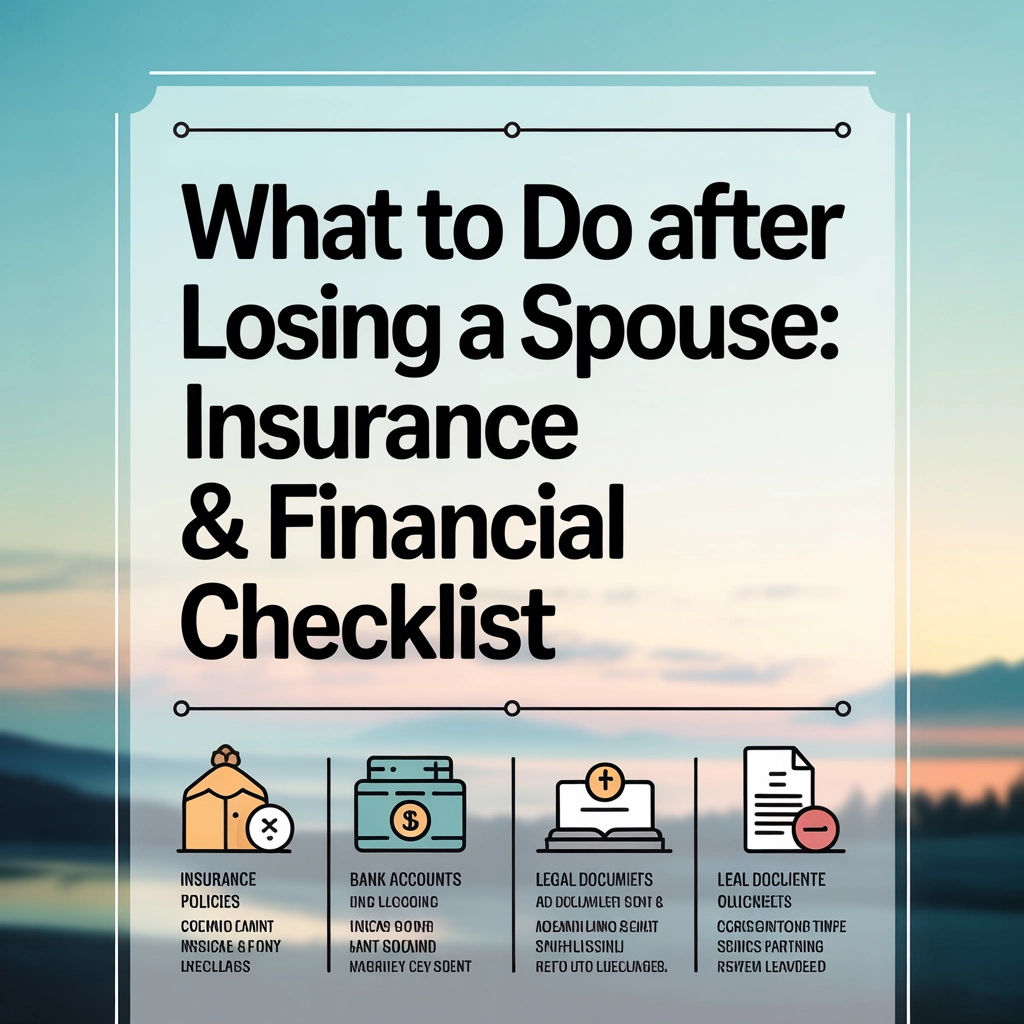What to Do After Losing a Spouse: Insurance & Financial Checklist

Losing your spouse is an emotional and overwhelming life event. In the midst of your grief, there are many practical matters that require your attention—from handling insurance claims to managing household finances. At VitalShield Insurance Services, we’re here to simplify those next steps and walk you through the process with clarity, care, and a sense of security.
Below, you'll find a straightforward, step-by-step checklist for managing the most important insurance and financial details after a spouse passes away.
Immediate Steps to Take
Before you jump into paperwork, try to take things one step at a time. These are the most urgent actions to take in the days immediately after a loss:
1. Get Multiple Copies of the Death Certificate
You’ll need these for everything from life insurance claims to closing accounts. Aim for 10–15 copies, available through your funeral home or the county clerk’s office.
2. Notify Key Parties
- Attorney: Contact your attorney (or your spouse’s, if different) right away. The legal team will help locate and execute the will or trust documents, and guide you through probate if necessary.
- Social Security Administration: Report the death by calling

 1-800-772-1213 or visiting your local office. Survivor benefits and other resources may be available for you.
1-800-772-1213 or visiting your local office. Survivor benefits and other resources may be available for you. - Employer(s): If your spouse was employed, notify their employer. Ask about any final paychecks, life insurance, and employee benefits, and whether they offer any grief support resources.

Insurance Matters
Now is the time to address insurance plans and make sure you and your loved ones are protected going forward.
1. Life Insurance Claims
Contact every company where your spouse has a life insurance policy, even small work-based plans. Provide the required documents, typically:
- A copy of the death certificate
- Completed claim forms
- Original policy document (if available)
Life insurance payouts are generally not considered taxable income, and proceeds arrive quickly—often within one to two weeks. This can help handle immediate expenses.
2. Health Insurance
Notify your health insurance provider of your spouse’s death. If you were insured under your spouse’s policy, ask if you qualify for COBRA or need a new plan. Review your own health insurance needs—VitalShield can help you compare individual coverage options and bridge the gap: Explore Our Health Insurance Plans.
3. Other Insurance Policies
- Auto and Homeowners: Change the names on all policies to remove your spouse and update beneficiaries where needed.
- Dental and Vision: If you were covered under your spouse’s plan, look into getting your own coverage as soon as possible. See Dental Insurance Options
- Check for Additional Benefits: Some credit cards, memberships, or associations provide small life insurance amounts—don’t overlook these.
Managing Financial Accounts and Institutions
Naturally, you’ll need to update and organize a variety of financial accounts.
1. Bank Accounts
- Joint Accounts: Bring a death certificate to update account titles. Consider keeping joint accounts open for at least 6–12 months to catch any remaining checks or automatic deposits.
- Individual Accounts: Close accounts solely in your spouse’s name or transfer them according to the will or by probate.
- Safe Deposit Boxes: Access may require paperwork or a court order—ask the bank about their specific policies.
2. Investment and Brokerage Accounts
Notify each institution of your spouse’s passing—provide a death certificate and follow their procedures for updating ownership. If an account is “Transfer on Death” (TOD), assets can generally move directly to beneficiaries outside of probate.
3. Credit Cards and Loans
- Credit Cards: For joint accounts, notify the issuer to remove your spouse’s name. For cards in their name only, provide notice and follow instructions to close the account.
- Loans and Liabilities: Check if you are listed as a co-borrower or co-signer on any debts; you may be responsible for ongoing payments. Review the fine print on all statements carefully.
4. Bills and Services
- Update the name on utility, phone, and internet bills.
- Cancel subscriptions and memberships that are only in your spouse’s name.
- Keep an eye out for any refund checks—it’s wise to leave certain accounts open for several months to ensure you catch everything.

Retirement Accounts and Employer Benefits
1. Retirement Plans
If you’re the beneficiary of an IRA or 401(k), you typically have these choices:
- Rollover the funds into your own IRA (if you’re the spouse)
- Leave the account as is and take distributions as needed
- Receive a lump sum (tax implications vary)
Contact the plan administrator and review your options with a financial advisor before moving funds.
2. Pensions
Did your spouse have a pension plan through current or previous work? Contact the plan administrator to apply for survivor benefits. Rules and payout options vary greatly—seek expert insight before making choices.
3. Employer and Union Benefits
Even after retirement, your spouse’s employer or union may offer survivor or life insurance benefits. Inquire about any accounts, final paychecks, stock options, or deferred compensation.
Budgeting and Asset Review
1. Create a Simple Budget
Losing a spouse almost always shifts your budget. List:
- Sources of income (Social Security, pensions, annuities, investments)
- All monthly and annual expenses
- Immediate bills (mortgage, property taxes, utilities, etc.)
This will clarify how your financial picture has changed and help you identify necessary adjustments.
2. Build Your Emergency Fund
Set aside 3–6 months’ worth of expenses in a savings or money market account. This gives you a buffer while you get your bearings.
3. Assemble Your “Big Picture”
Gather a full list of all your assets and debts:
- Bank and investment accounts
- Life insurance and annuities
- Real estate
- Vehicles
- Outstanding loans and credit balances
If you’re missing info, consult your spouse’s previous tax returns, credit report, or check mail for account statements.
Important Considerations and Cautions
1. Major Financial Decisions Can Wait
It’s best not to make big moves—like selling your house, moving, or investing large sums—right away. Give yourself a chance to grieve and fully absorb your new financial reality.
2. Some Things to Keep Private
When writing an obituary or announcing your spouse’s passing, skip personal identifiers like address, birth date, or details about inheritances to deter potential scams.
3. Get Professional Support
If you feel uncertain about legal, tax, or investment options, don’t hesitate to reach out to estate attorneys, trusted financial advisors, or your VitalShield agent. We’re here to help you navigate this—without pressure or overwhelm.

Your VitalShield Team is Here When You Need Us
Losing a spouse is never easy, but you don’t have to face these complicated insurance and financial steps alone. Start with the basics: gather your documents, inform the right parties, and take it one day at a time.
When it comes to reviewing your insurance needs or updating your coverage, our caring agents at VitalShield Insurance Services are ready to walk you through each option and answer any questions. For personalized support, explore more at VitalShield Insurance Services or reach out to your agent any time. You’ve got this—and we’ve got your back.
